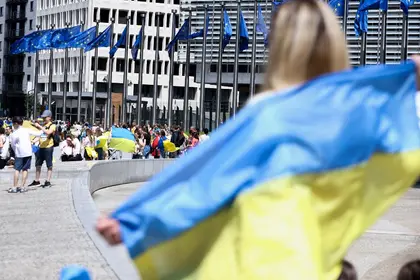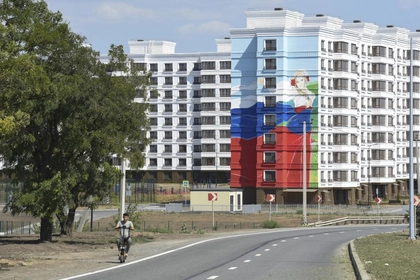On Wednesday, the European Commission (EC) recommended opening formal membership talks with Ukraine, a major step in Kyiv’s long and often fraught journey to join the EU.
“Today is a historic day,” European Commission president Ursula von der Leyen said.
JOIN US ON TELEGRAM
Follow our coverage of the war on the @Kyivpost_official.
“Ukraine continues to face tremendous hardship and tragedy provoked by Russia's war of aggression.
“And yet, the Ukrainians are deeply reforming their country, even as they are fighting a war that is existential for them.”
Von der Leyen said Ukraine had “fulfilled 90 percent of the recommendations” set out for it.
A green light to start negotiations
Next, leaders of EU states and governments will come to the European Council on Dec. 14-15 in Brussels and decide whether to accept the European Commission’s recommendation.
“Today's European Commission recommendation actually means a green light to start negotiations,” Ukrainian lawmaker Yevgenia Kravchuk told Kyiv Post.
Four days after Russia’s full-scale invasion of Ukraine on Feb. 24, 2022, Ukraine applied for EU membership and in June got candidate status under an accelerated format and has since implemented many EU recommendations even while fighting a war with invading Russia.
But Chairman of the Verkhovna Rada’s committee on Foreign Affairs politics and inter-parliamentary cooperation Oleksandr Merezhko, said that here on out Kyiv isn’t likely to get special treatment because of Russia’s invasion.

IMF Approves $1.1 Billion Loan Disbursement to Ukraine Before Trump Inauguration
“Although, in my opinion, one should be taken into account – the key fact that Ukraine now protects the whole of Europe and is paying a big price," he said.
He predicted that Moscow-friendly Hungary might try to erect barriers to Ukraine’s EU membership to try to gain concessions for itself.
Before the European Council meeting in mid-December, Ukraine’s parliament, the Verkhovna Rada, will likely vote on more “euro-integration laws.”
Which ones will be known after the Verkhovna Rada’s schedule is approved, Kravchuk said.
Lots of work for Ukraine
A decision in December to start talks does not mean Ukraine’s path to EU membership is clear.
“At the same time, it is a very definite step that confirms that the EU, as a whole, consciously and seriously sees Ukraine among its own members,” Kravchuk said.
Once membership talks are greenlighted, the EU and Ukraine will create negotiation groups.
“Hard work and the combined efforts of the government, parliament, and everyone is needed,” she said.
Once talks have started, Ukraine will get new recommendations every year based on how its progressing, Deputy Prime Minister of European and Euro-Atlantic Integration Olga Stefanishyna said.
Several years of negotiations
Talks will likely last several years. Many hope Ukraine will actually join the EU by 2030.
Merezhko said that in Poland’s case, talks lasted about six years: “The Polish government developed a special preparation program.”
“But it is important that in the future Ukraine during this time will become stronger and step-by-step will be integrated into the EU’s joint economic market,” Kravchuk said.
After Ukraine’s enacted what could be thousands of acts of legislations in 35 broad areas, it would finally be offered membership.
After this would be the signing of the accession agreement and its ratification in national parliaments.
Merezhko flagged two important things for Ukraine: political will from the EU and clear criteria that won’t change based on the political whims of the day.
“We need to act not so much on some signals or hints but based on specific requirements and recommendations. An honest dialogue between the EU and Ukraine must be established,” he said.
Accelerated accession – good or bad
Kravchuk said that an accelerated membership procedure in Brussels, as some have hoped for, simply doesn’t exist.
And for Ukraine’s accession to the EU, the consent of each capital is required.
“That is, in any case, political support is needed from each capital. But to invent an additional procedure can negatively impact and even make the process accession process longer,” Kravchuk said.
“Therefore, we follow the usual procedure, as it is prescribed in all the rules, and we at least understand what the process looks like.”
Merezhko, however, said that for Ukraine’s security, it's worth attempting to speed up the process.
“I believe it is the second-best guarantee of our security after joining NATO,” he said. “If Ukraine joined the EU by Feb. 24, 2022, Putin is unlikely to have dared to try something like the full-scale invasion. He understands that the economic and political power of the entire EU stands behind each member of the EU ... Accession of Ukraine to the EU – this a clear signal to Putin that Ukraine is not a gray area.”
Ukraine is already basically ready for membership in the EU, he said: “Conducting reform and developing European-level legal culture in Ukraine will be a lot easier if Ukraine is an EU-member.”
Ukrainians already feeling support from the EU
Ukraine is already receiving aid from the EU at an unprecedented level.
“Let’s be honest: the help we receive from the EU, Ukrainians already feel ... We are a partner treated as a future member of the EU and we are already a member of the European Union family because of our shared values,” Kravchuk said, indicating that the EU has already allocated €50 billion ($53.4 billion) to aid Ukraine.
Meanwhile all the Ukrainian government’s expenses, apart from defense, are already financed by the EU, US, IMF, and other partners.
“Regarding the common economic market, we have already implemented it within the framework of the Association (Agreement),” Kravchuk said.
“Certain benefits we’ve received and continue to receive. For example, the cancellation of tariffs has a positive influence on the Ukrainian economy... However, certain EU acts will only take effect for Ukrainians after full integration,” the deputy said.
You can also highlight the text and press Ctrl + Enter






